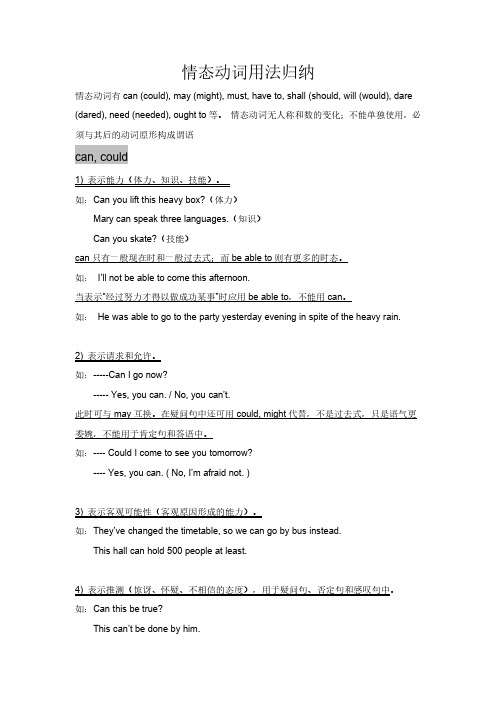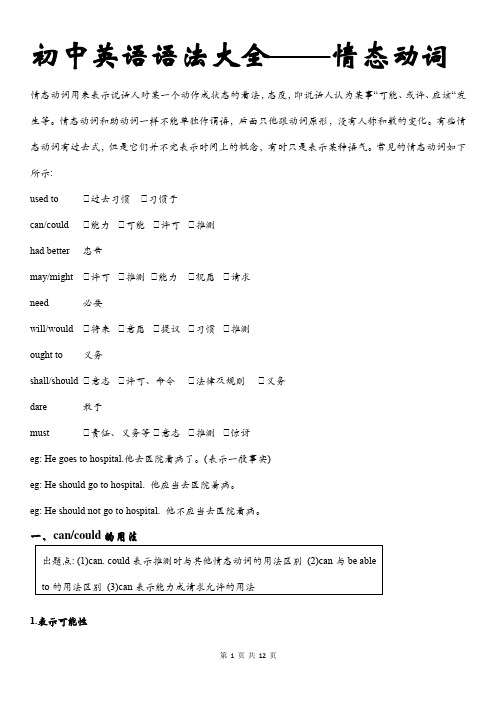初中英语情态动词PPT
情态动词(20张PPT)初中英语专项复习课件

(1)只作情态动词:must;can/could;may/might;ought to
(2)既可作情态动词又可作实义动词:need,dare
((34))既 具可 有作 情情 态态 动动词词某又些可特作征稿稿定助:定hPa动PPvTP,e词T/海h:量asd素ha材tlo持l;/s续hha更odublde;twteirll/would
【知识拓展】
1. must的一般疑问句,肯定回答为Yes, ...must.;否定回答为No, ...needn’t./No, ...don’t have
to.—Must I clean the classroom now? 我必须现在打扫教室吗?
—Yes, you must. 是的,你必须。/No, you don’t have to. /No, you needn’t. 不,你不必。
He promised he would never smoke again. 他承诺他再也不吸烟了。
Their English teacher would tell them stories in
表示过去反复发生的动 English after class.
作或某种倾向
他们的英语老师总是在课后用英语给他们讲故事
新,上千款模板选择总有一
款适合你
知识点二:情态动词的特点
情态动词的特点: (1)情态动词无人称和数的变化(have to除外); (2)情态动词后接动词原形; (3)情态动词的否定式是在其后加not; have to除外 (4)具有助动词的作用,可用来构成否定句、疑问句及用于简明答语; (5)个别情态动词有现在式和稿过定去PP式T两种形式,过去式用来表达更加客气、委 婉的语气,时态性不强,可稿用定于PPT过,海去量、素材现持在续更或将来。
情态动词(17张PPT)初中英语专项复习课件

表示需要、必须,主 要用于否定句和疑问 句中。needn’t常用 于回答must表请求的 否定回答
—Must I finish my homework now?我必 须现在完成我的家庭作 业吗? —No, you needn’t. 不, 你不需要。
注意 (1) must和have/has to均意为“必须”,常可互 换使用。但have/has to是用于强调客观需要,意为 “必须, 不得不”;must用于表示主观看法, 意为“ 必须, 应该”。如:We’ll have to ask Zhang Hong. 我们必须去问张红了。 We must work hard at school. 在学校我们必须 努力学习。
情态动词本身有一定的意义,但不能独立作谓语, 没有人称和数的变化,后面必须接动词原形。常见的情 态动词有:may, must, need, have to 等,具体用法见下表 :
情态动词
用法
例句
表示能力,意为 Sam can speak English well.
can “能,会”
山姆英语讲得很好。
He could have gone home. 他可能已回家了。
初中英语情态动词

初中英语语法情态动词知识
can表示能力,意为“能会”
表示推测,意为“可能”,常用于否定句和疑问句中
表示请求,允许,意为“可以”
could can的过去式,意为“能、会”,
表示过去的能力,在疑问句中表示委婉请求
may表示请求、许可,意为“可以”
表示推测,常用于肯定句中,意为“可能、也许”might may的过去式
表示推测,常用于肯定句中,意为“可能、也许”must表示主观看法,意为“必须、应该”
表示有把握的推测,用语肯定句
need表示需要、必须,主要用于否定句和疑问句中dare表示敢于,主要用于否定句和疑问句中should意为“应该”,表示要求和命令
表示劝告、建议
had better意为“最好”,表示建议
used to意为“过去常常,表示过去的动作、行为。
初中英语语法大全——情态动词

初中英语语法大全——情态动词情态动词用来表示说话人对某一个动作成状态的看法,态度,即说话人认为某事“可能、或许、应该“发生等。
情态动词和助动词一样不能单独作谓语,后面只他跟动词原形,没有人称和数的变化。
有些情态动词有过去式,但是它们并不完表示时间上的概念,有时只是表示某种语气。
常见的情态动词如下所示:used to ①过去习惯②习惯于can/could ①能力②可能③许可④推测had better 忠告may/might ①许可②推测③能力④祝愿⑤请求need 必要will/would ①将来②意愿③提议④习惯⑤推测ought to 义务shall/should ①意志②许可、命令③法律及规则④义务dare 敢于must ①责任、义务等②意志③推测④惊讶eg: He goes to hospital.他去医院看病了。
(表示一般事实)eg: He should go to hospital. 他应当去医院着病。
eg: He should not go to hospital. 他不应当去医院看病。
一、can/could的用法1.表示可能性(1) 表示说话者主观猜测的可能性时, can/could常用于否定句和疑问句中。
could 既可以表示过去的可能性,又可以表示现在的可能性,其语气更弱一些。
Who's the man over there? Is it Mr. Black? 那边那个男人是谁?是布莱克先生吗?--- It can't be him. He's much taller.不可能是他。
他更高一些。
(表示推测时用于否定句)eg: Could he still be alive after all this time? 过了这么长时间,他还可能活着吗? (表示推测时用于疑问句)(2)can用于肯定句中时表示理论上的可能性,即从理论上看有可但实际未必会发生。
有时指一时的情况,常意为“有时会”。
初中英语语法课件 几种情态动词的基本用法

EXERCISES
用适当的情态动词填空
needn’t
1. You
worry about me.
must 2. He looks so pale, he be ill.
3. Plants will die without sunshine.
3.must
表示“必须; 应该” We must finish our homework everyday.
表示“一定”
The book must belong to Jim , there is his name on the cover.
表示“硬要;偏要”
If you must go home, at least call your mom.
7. Students D tell lies. A. may not B. must C. can D. mustn`t
1. You A fail in the exam without hard working. A. will B. would C. mustn‘t D. can
2. He had to give up smoking because of his illness, C he? A. did B. does C. didn’t D. doesn‘t
2. may/might
表示请求、允许、许可, might比may的语气更委婉. 表示推测“可能”, could的可能性比can小。
—May I use the car ? —I’m afraid not. It might not be Jane. She hasn`t dicided to come here yet.
初中英语动词时态

❖ My brother and I gost,ox,scsho, ochl f后ro读m/Miz/onday to Friday.
动词的现在分词的构成
1. 一般加-ing; work---working
2. 以不发音的e结尾的词去e,加-ing; live---living
3. 以重读闭音节结尾,末尾只有一个 辅音字母的词,要双写该辅音字母, 再加-ing;stop---stopping
need 中
need + sth. need to do sth. We need more chairs. We need to plant more trees. 2.情态动词:放在疑问句和否定句中 You needn’t do it in such a hurry
助动词
❖ 协助主要动词构成谓语的动词叫 助动词,它对谓语动词起辅助作 用。被协助的词叫主要动词。助 动词本身没有含义,不可单独使 用。
词序 1 主语
2谓语
3 宾语
即句子的主体 是句子中的必不 动作、行为的对象, 可少的成分,说 是动作的承受者 明主语的动作
词性 名词;代词
实意动词Do
名词;代词;不定式 或相当于名词的词、
短语
基本句型2
❖ 状语的位置 1.孩子们玩游戏。 The children played games. 2.孩子们安静地玩游戏。 The children played games quietly. 3.孩子们在他们的房间里安静地玩游戏。 The children played games quietly in their room. 4.孩子们今天早上在他们的房间里安静地玩游戏。 The children played games quietly in their room this morning. 中文习惯于先交代时间和地点,但英语中状语往往放在主
初中英语中考总复习 第1编 语法专项突破 第8讲 情态动词

考点一
考点二
考点三
4.—Mum,
I go fishing with my friends now?
—Sure, but you
make your bed first.
A.can; need
B.may; have to
C.must; need D.need; must
答案:B
解析:征询别人意见时用委婉语气, 句首应为may, could等词。
考点一
考点二
考点三
(3)否定形式的不同: must的否定形式是mustn’t, 表示“禁 止, 不应该”; have to的否定形式是not have to, 表示“不必”, 相当于needn’t。如:
The boy had to stay at home alone because his parents both
stay at home until my
parents come back.
A.canபைடு நூலகம்
B.may
C.must
D.could
解析:句意: 我不能和你一起去。我必须待在家里直到我父
母回来。must“必须”。故选C项。
答案:C
考点一
考点二
考点三
活学活用
考点一
考点二
考点三
考点一
考点二
考点三
3.—Who’s drawing under the tree?
考点三
情态 用法
动词
含义 例句
用于第二人称疑问句中, will/ 表示征求意见或提建议 would will 用于各种人称, 表示
意愿
愿意
Will/Would you please take out the trash?
情态动词(12张PPT)初中英语专项复习课件

例句
可能性
The storybook could be Jim’s. He likes reading
小
could 很可能 stories.这本故事书很可能是吉姆的,他喜欢读故
事。
This book must be Lucy’s, for her name is on the must 一定 cover.这本书一定是露西的,因为封面上有她的名 大
态 动
had better 最好,用来提出建议
today.
词
情态动词的基本含义
分析近三年中考真题可知,情态动词的基本用法是中考必考点,考生需 掌握各个情态动词的基本含义(见"考点帮")。
在答题时,应注意结合语境,并考虑常见句型。 常考情态动词有can、may和must及情态动词的否定形式needn’t、
基 本 句
②可能,也许,表示推
They might laugh at me.
型
might 测
情
态 动 词
常 见 情
①必须,表示命令或主观 看法
—Must I finish the homework today? —No, you needn’t/don’t have to. He must be staying here.
基
①能,会,表示能力
I can sing.
本
②可能,表示推测,常用于否定句和疑 Can it be right?
句
问句
型
can ③可以,表示许可和征求对方意见
Can you help me?
情
①能,会,can的过去式,表 I could do it.
态
常
过去的能力
- 1、下载文档前请自行甄别文档内容的完整性,平台不提供额外的编辑、内容补充、找答案等附加服务。
- 2、"仅部分预览"的文档,不可在线预览部分如存在完整性等问题,可反馈申请退款(可完整预览的文档不适用该条件!)。
- 3、如文档侵犯您的权益,请联系客服反馈,我们会尽快为您处理(人工客服工作时间:9:00-18:30)。
精品PPT
注意:
• 1.有过去式dared。如: No one dared speak of it. 没有人敢提及此事。 2. How dare you/he/she/they…?表示说话人对
某人的行为表示愤慨。如: How dare you ask me such a question?你怎敢问
– 2. Your mother must be waiting for you now.
精品PPT
Might and may
1) 表示请求和允许。might比 may语气更委婉,而不是过 去式
否定回答时可用can’t 或mustn’t,表示“不可以,禁 止”。
----Might/ May I smoke in this room? ---- No, you mustn’t. ---- May/Might I take this book out of the room? ---- Yes, you can. (No, you can’t / mustn’t. ) • 用May I...?征徇对方许可时比较正式和客气,而用
精品PPT
Need 做行为动词
• Need sth • Need to do sth • Need doing=need to be done表被动 • 否定: don’t need
精品PPT
八:dare 敢
• 通常用于疑问句、否定句或条件句中 Dare you ask him?你敢问他吗? She dare not go out alone. 她不敢单独出去。 I don’t know whether he dare try. 我不知道他
Since the road is wet, it must have rained last night.
不存在 mustn‘t have done 的形式。其否定或 疑问形式须用 can(could) 来表示. 例如:
He can't have missed the way. I drew him a map.
• I think that he couldn’t/can't have gone abroad. I saw him just now.我 认为他不可能出国了。我刚才还看见他 了。
精品PPT
精品PPT
• John may/might not have passed the exam; he looks very sad.约翰可能没有 通过考试。他看起来很忧伤。
精品PPT
3.can/could have done 表推测一般用在 否定句和疑问句中,表示不相信或怀疑
的态度。
• Can/Could he have passed the exam? 他可能通过了考试吗?
精品PPT
三、can, could
• 1) 表示能力(体力、知识、技能)。 Can you lift this heavy box?(体力) Mary can speak three languages.(知识) Can you skate?(技能)
精品PPT
• 此时可用be able to代替。Can只有一般现在 时和一般过去式;而be able to则有更多的时 态。
• --I heard they went skiing in the mountains last winter.
• -- it ____ true because there was little snow where.
精品PPT
二、表推测的用法
• 1. must have done过去肯定做了某事
Someone is knocking at the door, and who can it be?
It can’t be Tom because he has gone to
Beijing.
精品PPT
四、 shall
1) shall 用于第一人称,征求对方的意见。 What shall we do this evening? shall I clean the room for you?
I’ll not be able to come this afternoon. • 当表示“经过努力才得以做成功某事”时应
用be able to,不能用Can。如: He was able to go to the party yesterday
evening in spite of the heavy rain.
精品PPT
3) 表推测可能性。
肯定句中:can表示理论上的可能性;may表 示事实上的可能性,如:
In Yuyao, sometimes it can be really cold.
Tom may go camping with us tomorrow, bn表猜测可能性。
我这样的问题? 3. I dare say表示“我相信,我认为,可能”。如: I dare say you are right精.品我PPT认为你是对的
作行为动词:可用于各种句子 中;在疑问句或否定句中,to
经常被省略。如
• Did anyone dare (to) admit it?有人敢 于承认吗?
• ---They ____ be ready by 12:00
精品PPT
3. 表示惊讶的语气
• You can never imagine such a gentleman should be so rude to a lady.
精品PPT
六: will 和would
1)表示意志或意愿:决心,愿意,…… • We will do our best to save the child.
精品PPT
五. should
1) 表示“应该”,常用来表示劝告、建议;认 为“某人应该做某事”或“有义务责任做某 事”。
We should obey traffic laws.
You shouldn‘t watch TV every day。
You shouldn’t have made this kind of silly mistakes.
Can I...?在口语中更常见。精品PPT
2)用于祈使句,表示祝愿。
May you succeed!
精品PPT
3) 表示推测、可能性(不用 于疑问句)。
• might不是过去式,它所表示的可 能性比may小。 1.He may /might be very busy now. 2.Your mother may /might not know the truth.
“The dictionary has disappeared. Who could
have taken it?”
精品PPT
may / might have done
• I can‘t find my keys. I may / might have left them at the school yesterday. 我找不到我的钥匙了。我可 能昨天把他们落在学校了。
精品PPT
• 2) shall 用于第二、三人称,表示说话人给对 方的命令、警告、允诺或威胁。
• 1. You shall fail if you don’t work hard.(警告) • 2. He shall have the book when I finish
it.(允诺) • 3. He shall be punished.(威胁)
He did not dare (to) leave his car there. 他不敢把车停放在那里。
If he dares to show up at her house I’ll be surprised. 如果他敢出现 在她的房子里,我会感到吃惊。
精品PPT
注意点一:
• 表推测可能性:must, can, may, might, can’t, couldn’t
精品PPT
由must引出的一般疑问句,肯定回答用 must,否定答语用needn't或don't have to。
如:
• —Must I do the work now? 我必须现在干这个 活吗?
—Yes, you must /have to. ---No, you needn't /don't have to.
Tom should have brought his report today.
这时它可以和 ought to, be supposed to 互
换使用
精品PPT
2) Should (ought to)表示推 测时,是指有一定根据的推测,
意为“可能、该”
• ---When can I come for the photos? I need them tomorrow,
情态动词复习
精品PPT
1. must
1) 表示必须、必要。是说话人的主观看法 You must come in time. 在回答引出的问句时,如果是否定的,
不能用mustn’t(禁止,不准),而用 needn’t, don’t have to(不必).
-- Must we hand in our exercise books today?
-- Yes, you must. -- No, you don’t hav精e品PPtT o / you needn’t.
1. must
– 2) 表示推测、可能性(只用于肯 定的陈述句) 1. You’re Tom’s good friend, so you must know what he likes best.
examination. 我宁愿考不及格,也不愿意考试 作弊。
